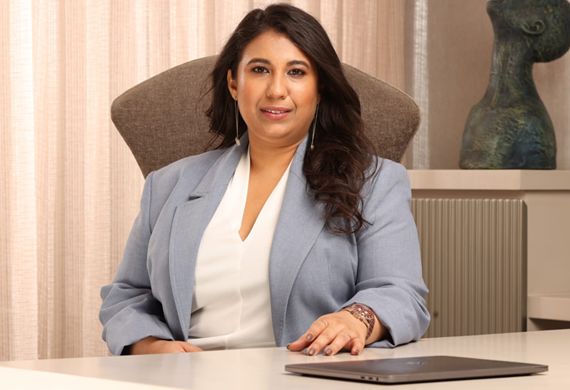
Innovating Real Estate with Smart Solutions & Sustainable Aspirations
By: Yukti Nagpal, Director, Gulshan Group
Yukti Nagpal blends her expertise in real estate with innovative strategies. With a background in Marketing Management and Business Administration, she drives impactful branding and champions women’s empowerment, particularly in real estate, through her visionary leadership and sustainable projects like Gulshan Dynasty.
In a recent conversation with Women Entrepreneurs Review, Yukti shares her insights on how luxury real estate developers can balance innovation with tradition to stay competitive, adopt unconventional eco-friendly strategies to redefine luxury, and how global economic conditions and trends impact luxury real estate markets worldwide.
In the current real estate landscape, where market volatility and shifting consumer preferences are prevalent, how can luxury real estate developers effectively balance innovation with tradition to stay relevant and competitive?
Today’s real estate market is dynamic and the only key to staying relevant is by balancing innovation and tradition. There is so much to learn and draw inspiration from our heritage, the classic designs of the past and its timeless charms. At the same time, we must embrace cutting-edge design, tech and sustainable practices to pave the way forward. In the end, it’s a choice of who the end consumer is, what are their preferences and aspirations and how can we infuse a sense of modern style, usability, and high functionality. Innovation, I believe, should elevate the luxury experience without diluting its essence, creating spaces that are both functional and aspirational. By understanding evolving consumer preferences, developers can integrate modern elements while maintaining the traditional luxury that has stood the test of time.
With the growing emphasis on sustainability, what are some unconventional strategies that luxury real estate developers can adopt to not only meet eco-friendly standards but also redefine the concept of luxury in a practical way?
Sustainability is certainly the need of the hour. With a growing emphasis on sustainable living, luxury real estate developers can redefine sustainability by focusing on holistic eco-friendly living rather than simply meeting green standards. Take, for instance, incorporating biophilic design, which integrates natural elements like greenery and water, can create an environment that blends nature with luxury. Additionally, investing in renewable energy systems such as solar panels or geothermal heating provides sustainable solutions without compromising comfort. Developers can also embrace modular construction techniques, which reduce waste and offer flexibility in design. These unconventional strategies allow luxury properties to not only meet sustainability goals but also elevate the buyer’s experience, aligning practicality with high-end living.
In the face of economic fluctuations and changing buyer expectations, what are the most significant challenges luxury real estate professionals are encountering today? Conversely, what unique opportunities are emerging as a result of these challenges, and how can companies capitalize on them?
Economy is stagnant now and changing buyer expectations present significant challenges in luxury real estate. High-net-worth buyers are becoming more selective, seeking properties that offer value beyond mere opulence, such as sustainability and personalization. However, these challenges also bring opportunities for developers to innovate. For instance, there is increasing demand for multi-functional spaces and technology-integrated homes. Companies that can swiftly adapt to these preferences and leverage emerging trends, like wellness real estate or smart homes, will stand out. By offering unique, value-driven solutions, developers can turn market volatility into opportunities for growth and differentiation.
How is technology revolutionizing the luxury real estate sector, particularly in terms of property management and client engagement? Can you share examples of how technological advancements are enhancing the luxury real estate experience and providing a competitive edge?
Technology is transforming the luxury real estate industry by enhancing both property management and client engagement. Smart home technology, including automated lighting, security, and climate control, offers clients unparalleled convenience and luxury. Virtual reality (VR) tours and 3D modelling have redefined how buyers interact with properties, allowing them to explore homes from anywhere in the world. Additionally, AI-driven analytics provide insights into buyer preferences, allowing developers to create highly personalized experiences. These advancements not only make the process more efficient but also offer a competitive edge by enhancing the overall luxury experience for discerning buyers.
How do global economic conditions and geopolitical events impact luxury real estate markets in different regions? What are the key considerations for developers and investors when navigating the interplay between global trends and local market nuances?
Global economic shifts and geopolitical events play a pivotal role in shaping luxury real estate markets. Currency fluctuations, interest rates, and political stability directly affect both local and international buyers’ purchasing power. Developers and investors need to be mindful of these variables when entering new markets or planning large-scale projects. In regions with stable economies, luxury markets often thrive, while in more volatile areas, developers must diversify their portfolios to mitigate risks. Understanding the global economic landscape allows developers to navigate these challenges while capitalizing on opportunities, especially in emerging markets where demand for luxury properties may rise.
Looking ahead, what are the potential game-changers for the luxury real estate market? Are there any upcoming trends or innovations that you believe will significantly impact how luxury spaces are conceived and marketed?
Several trends are poised to reshape the luxury real estate market in the coming years. Wellness-centered design, which integrates features like air purification systems, fitness spaces, and spa-inspired amenities, is becoming increasingly sought after. Additionally, the rise of eco-luxury, where sustainability meets high-end living, is set to redefine how buyers perceive value. Technological advancements, such as AI-powered home automation and virtual home design platforms, will continue to revolutionize the way luxury spaces are conceived, marketed, and experienced. These innovations promise to enhance the luxury real estate landscape, creating more personalized and immersive living environments.






